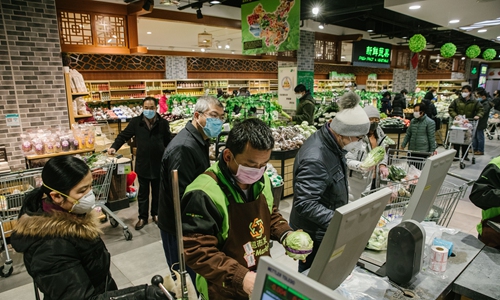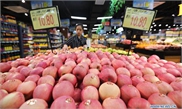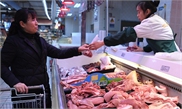China's February CPI likely hit 4.7% under impact of epidemic: analysts
February CPI likely hit 4.7% under impact of epidemic: analysts

People buy food in a supermarket in Beijing. Photo: Li Hao/GT
China's consumer price index (CPI) for February probably reached 4.7 percent amid the COVID-19 outbreak, lower than January's 5.4 percent, analysts said on Sunday.
"China's CPI growth in February is expected to have fallen in the range of 4.5 to 5.0 percent. It is highly likely that the year-on-year CPI growth rate will fall in February compared with January, given the low CPI base of 2019, which was 1.5 percent," Hu Qimu, a senior fellow at the Sinosteel Economic Research Institute, told the Global Times on Sunday.
Tang Jianwei, a senior macroeconomist at the Bank of Communications, estimated that the CPI soared 4.7 percent in February on a yearly basis.
The CPI rose 5.4 percent in January year-on-year, the highest rise since November 2011. The high CPI growth can be attributed to the effect of the COVID-19 outbreak, which led to a significant increase in logistics costs due to halted transportation services, and a shortage of supply.
"However, the central and local governments adopted measures in February to ensure the supply of materials and stabilize prices. Since transportation has gradually resumed, the consumer price will fall," said Hu.
Although the CPI is expected to fall sharply in April as the outbreak may come to an end, it will likely be 3 percent higher on a yearly basis, Ma Wenfeng, a senior analyst at Beijing Orient Agribusiness Consultancy, told the Global Times on Sunday.
The China Shouguang vegetable price index, a barometer of the country's vegetable market, fell 15.55 points to 150.21 on a monthly basis on Sunday. The index was approved by the Ministry of Commerce to provide an accurate reference for vegetable farmers and vendors.
"China should be vigilant to the risk of stagflation in the short term, but there is little chance of a stagflation in the near future. The virus epidemic has shown signs of being put under control. Businesses are recovering, and consumption should revive within a couple months, which will greatly boost economy," Hu noted.
But Tian Yun, vice-director of the Beijing Economic Operation Association, said that the epidemic will exacerbate inflation and the stagnation of the economy in the short term.
"In the long run, the rebound of massive new infrastructure investment will stimulate China's economy," Tian added.
The National Bureau of Statistics will release the CPI of February on Tuesday.


